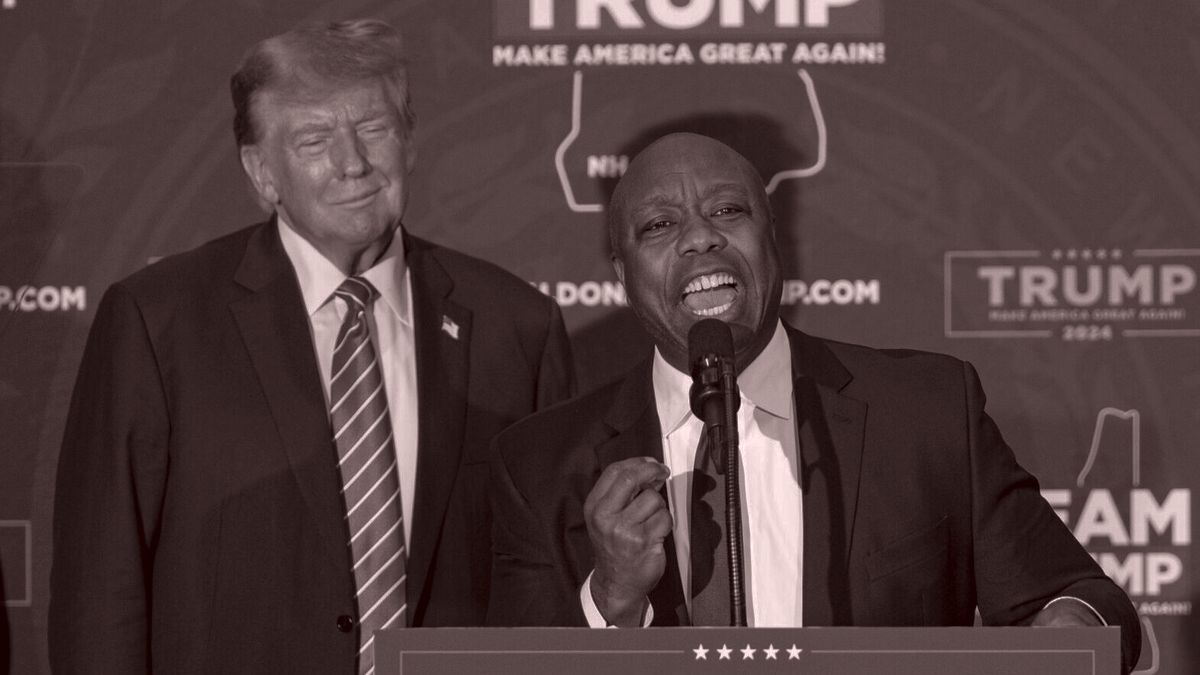Welcome back to The Best & The Brightest. I’m Leigh Ann
Caldwell. If you’re even remotely interested in the Oscars tonight, then you’ll definitely want to follow my partner Matthew Belloni, who will be at the awards and recording his impressions in What I’m Hearing, his flagship private email on Hollywood. (Sign up here.) If you care about red carpet fashion, then you must read my other partner Lauren
Sherman’s brilliant franchise, Line Sheet. (Sign up here. She may also be able to improve your wardrobe…) Speaking of the Oscars, I’m just gonna say it: I didn’t like Wicked.
As for politics on this Oscar Sunday, today I’m exploring the simmering tensions between
Trump’s political operation and the National Republican Senatorial Committee under Tim Scott. That beef could become really problematic if Scott can’t ward off the president’s instincts to back rabidly MAGA candidates in primaries.
But first…
|
- Johnson’s evolution: The ultimate ramifications of Friday’s Oval Office debacle with Ukrainian President Volodymyr Zelensky are still far from clear. (I can’t wait to read what my partner Julia Ioffe writes on Monday.) But I just can’t stop thinking about how Speaker Mike Johnson has almost completely lost his integrity on the issue. Last year, you’ll recall, Johnson was secretly meeting with Biden officials about
Ukraine, per The New York Times, and willing to lose his job as speaker in order to push $60 billion of aid for Ukraine through his divided conference. At the time, I asked him why he was so willing to stick his neck out for the cause. “History judges us for what we do,” he
said then.
Now, though, he’s piling on Zelensky at his nadir while the White House lurches ever closer to a strategic alliance with Vladimir Putin. Johnson is even suggesting that Zelensky has taken
advantage of the U.S., and made the rounds on the Sunday political shows to parrot Trump’s obsession—which J.D. Vance also articulated inside the Oval—that Zelensky hasn’t been effusive enough in his gratitude for the U.S. “He needs to come to his senses and come back to the table in gratitude,” Johnson said on Meet the Press.
Johnson has proven over and over again that keeping Trump on his side outweighs everything else. But his dramatic and
rapid reversal on Ukraine—which cost him so much anguish and political capital less than a year ago—is still remarkable, especially because history does indeed judge.
|
|
|
A MESSAGE FROM OUR SPONSOR
|
Medicaid funding cuts
pose a threat to children, seniors, veterans, and people with disabilities.
|
|
|
- Trump comes to Congress: Beyond what the president says during his joint address to Congress, it will be notable who attends. Members of both parties always use their guest lists to make political statements, and Tuesday’s address will be among the first opportunities that Democrats get to test their evolving national messaging during the second Trump era. Expect counterprogramming that features people affected by threats to Medicaid, veterans fired by Elon
Musk, and victims of NIH cuts.
Democrats got new ammo on Friday when Musk called Social Security a “Ponzi scheme” in a podcast interview with Joe Rogan, adding fresh urgency to their warnings that Republicans want to slash a nearly century-old program that keeps some 22 million Americans out of poverty. Musk, bound to become a political liability sooner or later, has potentially made a colossal error that will be difficult for Republicans to walk back from in the
midterms, even if they don’t touch Social Security benefits. It’ll be worth watching to see whether Trump comments on entitlements Tuesday night.
|
|
|
The president wants to avoid a repeat of his party’s 2018 midterm
shellacking. But there’s already friction with N.R.S.C. chair Tim Scott, and plenty of beef with a crew of ’26 incumbents.
|
|
|
In early February, shortly after his inauguration,
Donald Trump dispatched two of his top aides to deliver an early warning to Senate Republicans. In a private meeting on Capitol Hill, deputy chief of staff James Blair and White House political strategist Matt Brasseaux told Senate chiefs of staff that without Trump on the ballot, their best chance of winning reelection would be to fully embrace the president’s agenda, according to two people who attended.
The goal is twofold. First, of course, Trump wants to leverage the next election cycle to ensure that Republicans move with him in lockstep. But the president is also keenly aware that the clock is ticking on his party’s power trifecta in Washington. If Republicans lose the House or Senate in 2026—the inevitable boomerang that usually befalls a sitting president—the final two years of Trump’s second-term legacy project will presumably grind to a halt, stymied
by Democratic-led investigations and even, possibly, impeachment attempts. Trump has no interest in repeating 2018, I’m reliably told.
|
|
|
A MESSAGE FROM OUR SPONSOR
|
Medicaid funding cuts
pose a threat to children, seniors, veterans, and people with disabilities.
|
|
|
Losing one or both chambers may be inevitable, but Trump and his
team appear to have learned several key lessons from his first term: For one, they’ve already been much more involved in coordinating and communicating with the House and Senate campaign committees and their affiliated outside groups. Trump has raised more than $200 million since the election, at least some of which the president will spend on electing
loyal Republicans in 2026, according to a person close to Trump’s political operations. Meanwhile, congressional committees, which are just starting the candidate recruitment process, have been told not to elevate any candidates that Trump wouldn’t support. “Let’s not waste our own time and put ourselves in a situation where we’ve got long drawn-out primaries,” that person said.
Trump’s political
tentacles are especially evident in the Senate, where, for the first time in nearly two decades, Mitch McConnell isn’t overseeing the Republicans’ political operation. John Thune, who replaced McConnell as majority leader, has hired Johnny DeStefano, a top advisor to the president during Trump I. He also sought permission from Susie Wiles, Trump’s chief of staff, to hire Alex Latcham, a top Trump political aide
since 2016, as executive director of his affiliated super PAC, the Senate Leadership Fund.
But not everything has been seamless. I’m told there is unresolved tension between the Trump team and the new head of the National Republican Senatorial Committee: Senator Tim Scott. A former Trump adversary in the G.O.P. primary, Scott is an affable but not necessarily politically astute operative
who took over from Montana Republican Steve Daines, a close Trump ally. Whereas Daines was masterful at keeping wacky Trump endorsements at bay—he helped Republicans to pick up four seats, and the Senate majority, in 2024—Scott appears to be struggling to fulfill his dual mandate of placating Trump and protecting the majority.
Not only did he fail to run critical hires by the president and
his team, but he also selected two people who are actively distrusted by Trumpworld to run the organization: Stephen DeMaura, the former manager of Mike Pence’s 2024 campaign (bad idea!), and Brendan Jaspers, whose former employer, the Club for Growth, had a long-running feud with Trump. (“The N.R.S.C. is committed to delivering President Trump’s agenda for the next four years,” said Joanna Rodriguez, a spokesperson for the
group. “This means working as one team with all our allies and partners to protect and grow our Republican Senate Majority.”)
To clear the air, Scott spoke to Trump about his team, I’m told. The president told Scott that he can hire whomever he wants as long as he wins, and Scott told Trump he would put the right people in place. But beyond that meeting, Trump’s political circle thinks Scott hasn’t done enough to prove himself—and that if he can’t deliver, they’ll
deploy their own war chest to take control of the 2026 game board. “I think our political organization will ultimately do what’s in the best interest of the president, and if that means taking a more leading role, or sort of using our elbows to put specific things in motion, we will,” Blair told me. “Our political operation will do what serves the president best, without much regard for whether or not that bothers anyone.”
|
The midterm calculus is complicated in part because of Trump himself, who has a
history of intervening in primaries to the detriment of the party—putting his finger on the scale for losing candidates like Dr. Oz, Herschel Walker, and Kari Lake. Ideally, Trump would deploy his money and endorsements to prevent expensive, bloody Republican-on-Republican primaries. On the other hand, if he chooses to back candidates that challenge incumbents, the party could be on an expensive collision course. The N.R.S.C.’s policy
of defending and supporting incumbents could, as one Senate chief put it, “become a bitch really quickly.” Scott’s influence with Trump, and his ability to remain on the same page with the president, will be tested as soon as candidate recruitment picks up.
To wit: Next year, Republicans must defend two competitive Senate seats—those held by Susan Collins in Maine and Thom Tillis in North Carolina. Collins, a longtime Trump semi-antagonist despised by the
MAGA right, is facing a primary challenger for the first time in her nearly 30-year career. But Collins will likely get a free pass from Trump, multiple Republicans have told me. Despite his personal animosity toward her, Trump understands that if Collins isn’t on the ballot in Maine, a state that went +7 for Kamala Harris in 2024, then Republicans are practically guaranteed to lose that seat. He would much rather have Collins, an annoyance to him, than a Democrat, said two
people who have spoken to Trump about the Senate map. It probably doesn’t hurt her cause that she largely rubber-stamped his cabinet appointments, with minor hemming and hawing.
|
|
|
Tillis may be in more danger, and is being closely watched by
Trump’s team—a message that has been received loud and clear in North Carolina, a Trump +3 state. Tillis has been a vociferous defender of Ukraine and a
critic of the administration’s plans for Gaza, and it obviously didn’t escape notice that Tillis voted for Pete Hegseth’s confirmation only after Trump floated endorsing a primary challenger. Since then, Tillis, an astute politico, has told confidants that he is working to stay in Trump’s
good graces by staying in touch with him and Wiles.
Meanwhile, the deep red states could really scramble Trump’s primary calculus. In Texas, the mild-mannered, sometimes bipartisan John Cornyn could face a primary challenge from Ken Paxton, the ultra-Trumpy, previously impeached Texas attorney general. Cornyn, who announced this week that he’s running for a fifth
term, is a reliable Republican vote, a former N.R.S.C. chair, and a former member of G.O.P. leadership. But Republican operatives say that if Paxton dives in, there would be no clear favorite—which, of course, would set up a brutal red-meat primary that would suck up massive sums of Republican money (a blessing for Democrats) and create a significant distraction. Trump is a major wild card here, and could upend the race if he encourages Paxton to run. (Rep. Wesley Hunt, who has
also floated a run, recently met with Scott and suggested he would be the “third candidate” behind Cornyn and Paxton. Scott made clear that the N.R.S.C. is backing Cornyn.)
The final open question is what will Trump do about Senator Bill Cassidy, the wonky Louisiana Republican who voted to convict Trump in his impeachment over the January 6 attack. Trump’s dislike for Cassidy is deeply
personal, and Cassidy has done little to kiss the ring—a prerequisite to repair that relationship, Republicans close to Trump say. He hasn’t reached out for a meeting, and his waffling on Trump nominees Robert F. Kennedy Jr. and Kash Patel didn’t help, though he ultimately voted to confirm both.
Trump feels little compulsion to forgive Cassidy for his sins, because even a log can win
a general election in Louisiana if it’s a Republican. “The only (people) who can fix this are Donald Trump and Bill Cassidy,” said a Republican operative close to Trump. If the N.R.S.C. sticks to its pledge to protect incumbents and Trump backs a primary, it won’t be pretty.
|
|
|
Join Emmy Award-winning journalist Peter Hamby, along with the team of expert journalists at Puck, as they let you
in on the real conversations insiders are having across the four corners of power in America: Wall Street, Washington, Silicon Valley and Hollywood. Puck’s contributors will bring you smart conversation around the inside stories happening in these worlds. Presented in partnership with Audacy, new episodes publish daily, Monday-Friday.
|
|
|
Unique and privileged insight into the private conversation going on inside Wall Street, as told by the
best-selling journalist and former M&A banker.
|
|
|
Need help? Review our FAQ page or contact us for assistance. For brand partnerships, email ads@puck.news.
You received this email because you signed up to receive emails from Puck, or as part of your Puck account associated with . To stop receiving this newsletter and/or manage all your email preferences, click
here.
|
Puck is published by Heat Media LLC. 107 Greenwich St, New York, NY
10006
|
|
|
|



























